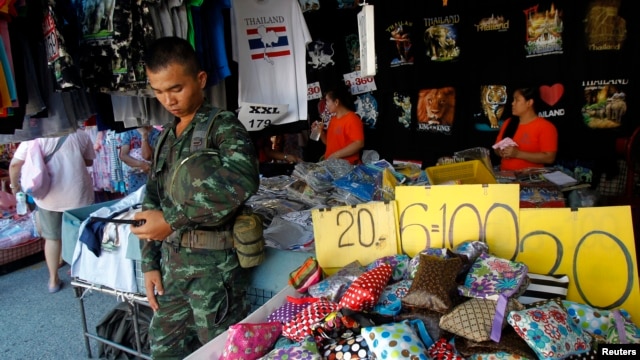
Thailand's junta kept many of the thousands of troops and police off the streets as the number of people making a public show of dissent to the May 22 coup dwindled. A soldier stand guards at a shop at Chatuchak market in Bangkok, Thailand, June 8, 2014.
BANGKOK — Thailand's junta kept many of the thousands of troops and police it readied to deal with protests in Bangkok on Sunday off the streets as the number of people making a public show of dissent to the May 22 coup dwindled.
The military has cracked down hard on pro-democracy dissidents and supporters since it ousted Prime Minister Yingluck Shinawatra last month, seeking to mute criticism and nip protests in the bud.
A heavy security force presence at potential flashpoints in Thailand's largest cities has limited protesters to small gatherings, which are often coordinated through social media and mostly located around shopping malls.
On Sunday, few protests took place and the security presence was lighter. Half a dozen women outside a mall gave the three-fingered salute that has become a symbol of defiance to the coup.
Protesters posted photographs on social media of small groups at Bangkok's main international airport making the same salute, which was inspired by the film “The Hunger Games.”
Protesters detained
Police detained four protesters, deputy national police chief Somyot Poompanmoung said. Since the coup, authorities have forced detainees to sign statements declaring they will desist from political activity as a condition of release.
“Those four people will be brought to the army camp to tune their political attitude later,” Somyot told Reuters. “We did not use the full capacity of the forces. The protest was peaceful and it has ended now.”
The force on Sunday ready for deployment numbered more than 6,000, Somyot said. Army chief and coup leader Gen. Prayuth Chan-Ocha had instructed security forces to avoid confrontation, he said. Police would photograph protesters, identify them and issue arrest warrants later.
The military coup in May was the latest convulsion in a decade-long conflict between the Bangkok-based royalist establishment and the rural-based supporters of Yingluck and her brother, former prime minister Thaksin Shinawatra.
Thaksin, who was ousted in a 2006 coup and has lived in self-exile since a 2008 corruption conviction, won the loyalty of the rural poor with populist policies and was the real power behind the deposed government of his sister.
Yingluck was prime minister until May 7, when a court found her guilty of abuse of power and she stepped down.
The army toppled the remnants of her government on May 22, saying it needed to restore order after six months of sometimes violent anti-government protests that had brought the economy to the brink of recession.
Thailand has been without a properly functioning government since December, when Yingluck dissolved parliament and called a February election in a bid to end anti-government protests. But protesters disrupted the vote, the election was annulled, and her caretaker government limped on until Prayuth seized power.
Foreign investments
The military has moved swiftly to revive the economy, and has given itself two months to clear a backlog of applications from local and foreign investors to spend more than $21 billion on projects in Thailand.
The backlog arose because Yingluck's caretaker government lacked the power to appoint a new team to run the Board of Investment to replace executives whose term ended in October.
Prayuth on Saturday declared himself the head of the body considering the investment applications, a position typically held by the prime minister.
Quick approval would bring longer-term stimulus to the economy and follow the payment of billions of dollars in subsidy arrears to rice farmers that has already lifted consumer sentiment.
The military's move to pay debts to farmers quickly after seizing power contributed to the first rise in consumer sentiment in 14 months in May. Political turmoil had sunk consumers confidence to a 12-month low in April.
The junta is reviewing infrastructure projects planned by the previous government but delayed during the protests and will press ahead with some. Among those under review are several
In the face of international condemnation of the coup, Prayuth has asked for patience for at least a year while the military engineers reforms that he says the country needs before democracy can be reinstated. |
|
